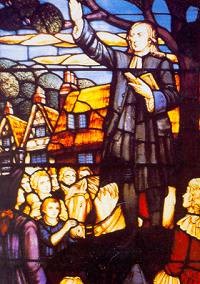|
Nineteenth-century Protestant quests for complete freedom from sin.
|
 |
|
Holiness
movements have their
roots in Wesley's revival
|
The holiness movements
arose from nineteenth-century American
evangelicalism and from the continuing legacy of John
Wesley and Methodism. Their aim was conversion, followed by a life
of personal holiness or complete freedom from sin. This quest for perfection
was directed toward both self and society, and inspired many efforts at
social reform. Camp meetings, prayer meetings, and revivals led to "holiness"
denominations, such as the Church of the Nazarene, the Salvation
Army, and the Wesleyan Methodist Church. Phoebe Palmer (1807-1874)
was a leader of the holiness movement. Through her public speaking and
books such as The Way to Holiness she inspired many to "surrender
everything to God." Palmer influenced many Christian women, including
Catherine Booth, to become public speakers, writers, and reformers. In
the early twentieth century Pentecostalism
linked holiness with particular spiritual gifts.
|